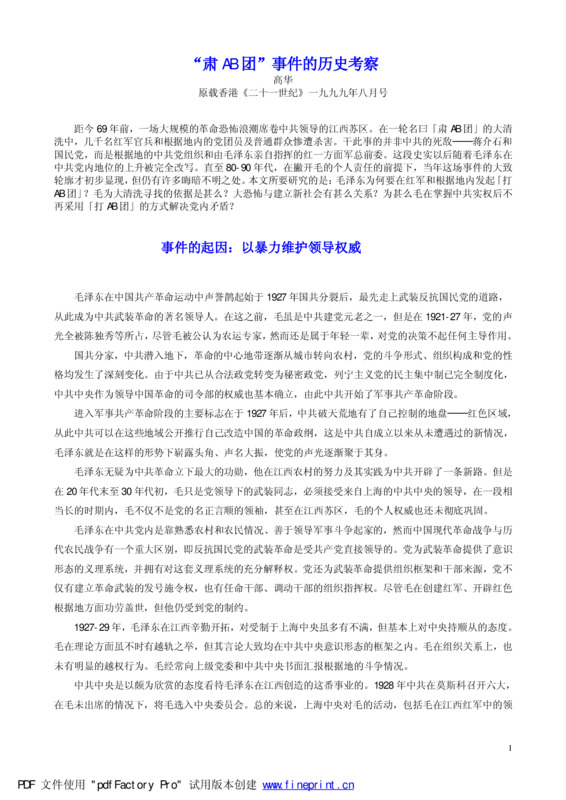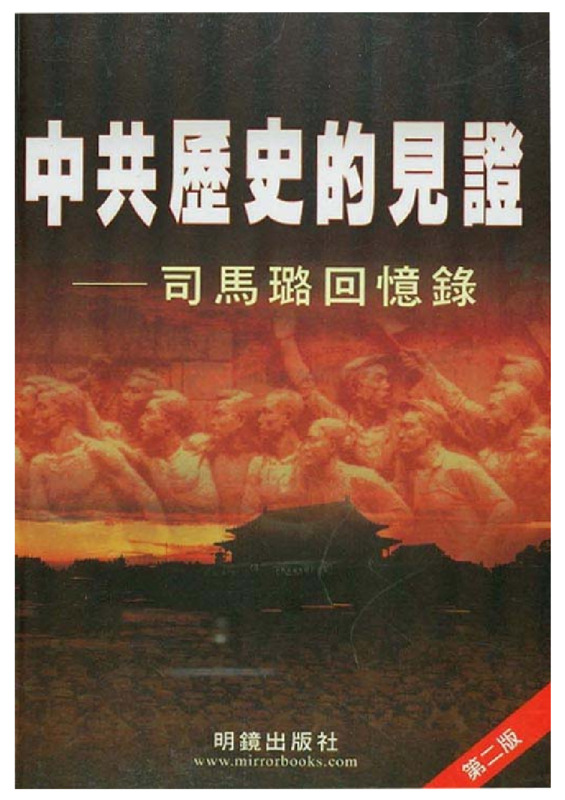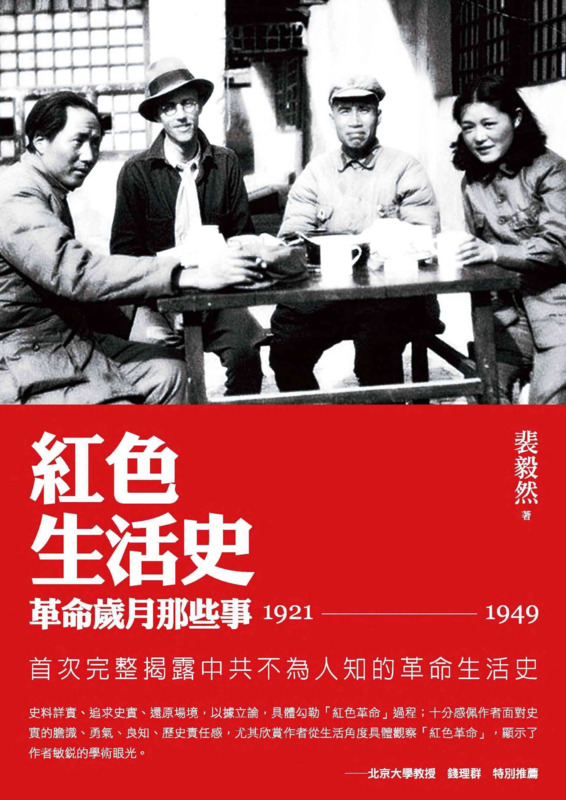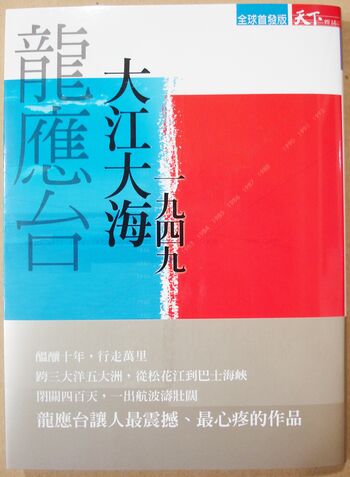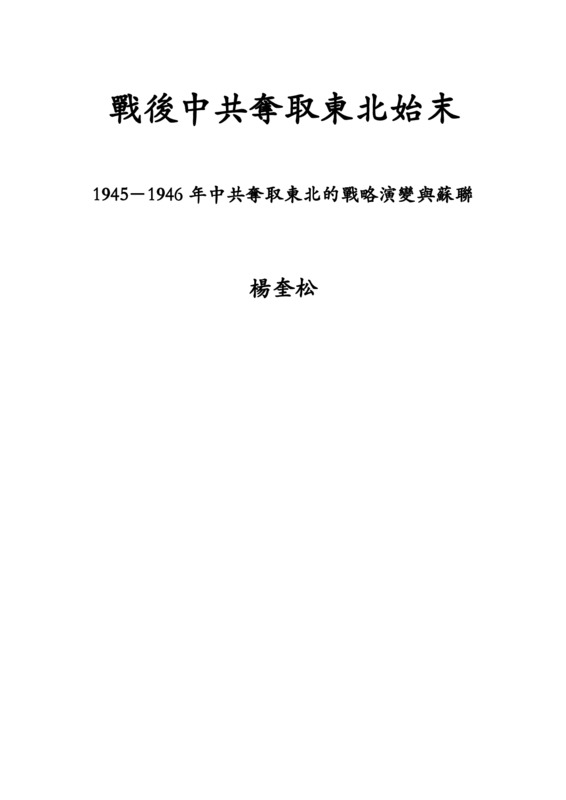Explore the collection
Showing 10 items in the collection
10 items
Article
Historical Examination of the Purge of the "AB" Regiment
More than 70 years ago, a massive wave of revolutionary terror swept through the CCP-led Jiangxi Soviet Union. Thousands of Red Army officers and soldiers, as well as members of the Party and the general public in the base area, were brutally murdered in a purge called the "Purging of the AB Troupe." Gao Hua's article examines why Mao Zedong initiated the "purge of the AB Group" in the Red Army and the base areas. What was Mao's rationale for the Great Purge? What is the relationship between the Great Terror and the establishment of a new society? Why did Mao stop using the "Fighting the AB Groups" as a means of resolving internal conflicts in the Party after he assumed real power in the CCP?
Book
Mao: The Unknown Story
This book presents the dramatic life of Mao Zedong, revealing a wealth of unheard-of facts: why Mao joined the Communist Party, how he came to sit at the top of the Chinese Communist Party, and how he seized China step by step. Writers Jung Chang and her husband Jon Halliday took ten years to complete this book, interviewing hundreds of Mao's relatives and friends, Chinese and foreign informants and witnesses who worked and interacted with Mao as well as dignitaries from various countries.
Purchase link:https://www.amazon.com/Mao-Story-Jung-Chang/dp/0679746323.
Book
Memoirs of Sima Lu: A Witness to the History of the Chinese Communist Party, The
Sima Lu (1919-2021) was an expert on the history of the Chinese Communist Party. He joined the Chinese Communist Party in 1937, then was politically persecuted in Yan'an, left it, and was expelled from the Party in 1941. In 1952, Sima Lu published “Eighteen Years of Struggle” in Hong Kong, writing about his tortuous journey from defecting to the Communist Party to his awakening and eventual choice of freedom. It became a sensation. He has made in-depth special studies on several leading figures of the CCP, such as Qu Qubai and Zhang Guotao. His memoir, “Witness to the History of the CCP”, is divided into three chapters according to its contents: the first is about his personal experience, the second about the first generation of CCP figures, and the third is devoted to the struggle between Mao Zedong and Zhou Enlai.
Book
Newly Discovered Mao, The: Volume I
Author Wang Ruoshui spent his early years studying philosophy at Peking University. He served as deputy editor-in-chief of the Communist Party newspaper “People's Daily” and was able to participate in high-level ideological discussions, gaining a deep understanding of Mao Zedong as a person and of his thought. He was one of the rare intellectuals within the CCP system who had an independent personality as well as the ability to think for himself. After his death from cancer, his wife, Feng Yuan, helped put together this posthumous book. Published by Ming Pao Press in 2002, it has been described as "the first and most comprehensive and in-depth discussion of Mao Zedong and his thought."
Book
Newly Discovered Mao, The: Volume II
Author Wang Ruoshui spent his early years studying philosophy at Peking University. He served as deputy editor-in-chief of the Communist Party newspaper "People's Daily" and was able to participate in high-level ideological discussions, gaining a deep understanding of Mao Zedong as a person and his thought. He was one of the rare intellectuals within the CCP system who had an independent personality as well as the ability to think for himself. After his death from cancer, his wife, Feng Yuan, put together this posthumous book. Published by Ming Pao Press in 2002, it has been described as "the first and most comprehensive and in-depth discussion of Mao Zedong and his thought.
Book
Red Life History - The Revolutionary Years (1921-1949)
Professor Pei Yiran's book is the first complete revelation of the untold revolutionary history of the CCP. The book covers many important points in the history of the CCP, including the use of Soviet rubles to build the party, the landlords fundraising campaign, and the love life of Mao Zedong and Jiang Qing, among subjects.
Book
The Great River and the Sea: 1949
This book by Taiwanese author Lung Ying-tai, published by Taiwan's <i>World Magazine</i> in 2009, is a detailed account of the history related to the period before and after the 1949 Nationalist-Communist Civil War from a literary perspective. After ten years of preparation, Long Yingtai traveled for 400 days to Changchun, Nanjing, Shenyang, Matsu, Taitung, and Pingtung to visit many survivors of the Nationalist-Communist Civil War.
Book
The Herald of History: The Solemn Promise of Half a Century Ago
Compiled by the Sichuan writer Xiao Shu (b. 1962), this book offers a variety of pro-democracy statements released by the Chinese Communist Party media, including short commentaries, speeches, editorials, and documents from <i>Xinhua Daily, Jiefang Daily, Party History Bulletin</i>, and <i>People's Daily</i> from 1941 to 1946. The essays criticize the Kuomintang government for running a "one-party dictatorship" and promised freedom, democracy and human rights.
The book was published by Shantou University Press in 1999. <a href="https://archive.ph/20220329191611/https://www.rfi.fr/tw/%E4%B8%AD%E5%9C%8B/20130817-%E9%A6%99%E6%B8%AF%E5%A4%A7%E5%AD%B8%E5%86%8D%E7%89%88%E3%80%8A%E6%AD%B7%E5%8F%B2%E7%9A%84%E5%85%88%E8%81%B2%E3%80%8B">According to Xiao Shu</a>, the book was heavily criticized by the then-head of the Propaganda Department, Ding Guangen. The publishing house was temporarily suspended, and copies of the book were destroyed. It was republished in Hong Kong by the Bosi Publishing Group in 2002, and reprinted by the Journalism and Media Studies Center of the University of Hong Kong in 2013.
Book
Who is the New China
Author Xin Hao Nian tries to analyze the modern history of China since the Xinhai Revolution. He pointsout that the People's Republic of China (PRC) is a restoration of the authoritarian system, and the Republic of China (ROC) represents China's road to a republic. The first volume of the book defends and clarifies the history of the Kuomintang (KMT), arguing that the KMT is not a "reactionary faction" as claimed by the CCP. The second volume criticizes the revolution and history of the CCP. The book was first printed in 1999 by Blue Sky Publishing House (USA) and reprinted in June 2012 by Hong Kong's Schaefer International Publishing. It is banned on the mainland.
Article
Yang Kuisong: The Beginning and End of the CCP's Seizure of the Northeast after the War
The occupation of the Northeast was key to the CCP's success in seizing power in 1949. The author of this book, Yang Kuisong, is a professor and doctoral director of the Department of History at East China Normal University, and a researcher at the Institute of Modern History at the Chinese Academy of Social Sciences. This book describes the CCP's taking of the Northeast as well as the competition between the U.S. and the Soviet Union at that time. After reading it, you will understand: how the Soviet Union played a key role in the CCP's occupation of the Northeast.
